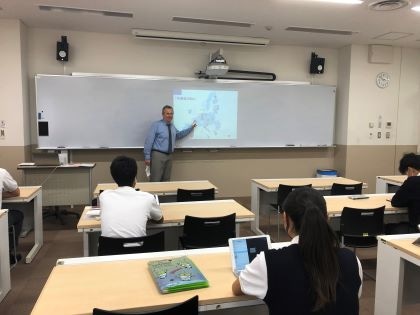- TOP
- Jean Monnet Activities
- Jean Monnet Chair (Agreement No. 2018・3245 / 004 – 001)
- EVENTS Jean Monnet Chair
- 10th June 2021 Lecture on EU at Kwansei Gakuin Senior High School
[ Editor: Institute for Industrial Research 28th July, 2021 ]
10th June 2021 Lecture on EU at Kwansei Gakuin Senior High School
Lecture Title:“Basics of European Integration – Single Market, Single Currency and Freedom of Movement”
Date & Time: 10th June 2021 1p.m. - 2:30p.m.
Place: Kwansei Gakuin Senior High School
Lecturer: Holger Bungsche, Professor, School of International Studies, KGU
Language: Japanese
Number of participants: 8
Purpose:
The purpose of the class was to make high school students understand that in the single economic area of the EU using one currency the four freedoms of movement (goods, capital, services and people) are essential for the functioning of the economy and the common currency.
Description:
In Japan people of all age groups are very sceptic with respect to labour migration. This is also the reason that many people feel quite some sympathy with Great Britain for leaving the EU. As widely believed in Japan, the right of free movement of people in the EU has resulted in a huge increase of migrant workers in Great Britain allegedly pushing down wages and forcing domestic workers out of work. Not just to unemployment of domestic workers, labour migration is often also explicitly connected to illegal claims to social benefits in the host country, to increasing crime rates or even to terrorism.
The lecture first presented European unification as a process of removing boundaries not just for business and trade, but in particular in order to foster the intercourse of the people of Europe, for which the Erasmus program maybe stands out as the most representative example. Next the lecture explained that in a single market not only goods and capital, but also labour and services, which depend to some large extent on human movement, have to be free. More than that, for the smooth functioning of a single currency like the Euro a certain level of movement of people between the member states of the currency union is even necessary in order to achieve an optimal currency area.
After a break, the lecture intended to provide proof, that movement of labour and labour migration are in general positive, both for the host country as well as the country of origin of labourers. By presenting recent trade and production data of Great Britain the lecture finally outlined how leaving the EU has already negatively impacted the economy of the United Kingdom, particular because of a considerable decline in foreign labour, for instance in agriculture and horticulture.
Reaction to the Lecture:
One high school student commented: “I always thought that foreign workers take away employment from local workers, but today I learned that migrant workers are considerably contributing to the overall economic development of a country so that even more local people could find employment”.



